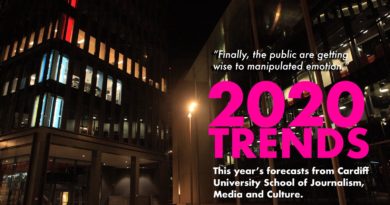Pobl Caerdydd – Engaging with communities to transform community news
Posted by Sara Moseley
Local news has always been the lifeblood of communities. Nowhere more so than in Wales – traditionally, a country-wide patchwork of small, connected communities. A nation of people very tied to and shaped by place and all that goes with it.
The National Library of Wales in in the midst of a mammoth enterprise to digitize all Welsh local newspaper content. So far, you can search over 2.5 million articles published between 1844 – 1910 on their site. The anniversary of the First World War will see publication of news up to the outbreak of that cataclysm.
That content illustrates clearly the importance of place. Any two Welsh people meeting for the first time will get straight to the point – “Where do you come from?”, they ask, pausing expectantly….. The answer is important….. The answer may shape you future relationship….. Far from this seemingly inconsequential nugget will be inferred a whole social history and assumptions of kinship and knowledge. Doors may open. Or close.
As well as word of mouth, much of the knowledge and news which feeds such networks has been supplied by and is reflected in local – sometimes very local – papers. The changing nature of news gathering and consumption coupled with the continuing thirst for local news is what spurred us to set us to set up the Centre for Community Journalism. Working in English and Welsh, its fusion of research based knowledge about hyper local news and training for practitioners aims help grow a vibrant sector drawing in new audiences through digital technologies.
Wales has a unique network of community newspapers in Welsh. The 50 or so Papurau Bro grew in response to a need for very local news reflecting the nature of Welsh speaking communities. But, like most other print media, Papurau Bro have been affected by the digitization of communication. By and large, circulation is declining and the average age of readers and contributors increasing.
Part of our role is to investigate business models that may involve a healthy mix of professionalism and volunteerism.
The future will be digital but will also involve a range of old and new technologies to help hyper locals maximize their potential. As part of our aim of working with them to test new ideas, new models and new approaches, we were very happy to be approached by Y Dinesydd, the paper for Cardiff.
Set up 40 years ago and run by volunteers, they were keen to become digital, faster moving and more appealing to a younger audience group. With 36,000 Welsh speakers, mostly under 45, there is clearly potential for such a venture in Cardiff and a big gap. But first, we needed to work together to enhance, retain and avoid alienating the old, traditional paper whilst coming to an understanding of the need for a totally new approach and a refreshed team of commissioning editors and contributors.
It has taken a lot of time, talk and cups of tea. The breakthrough came when, via public meetings and using networks, we helped form a new team with the passion and skill to move things forward. It’s been a joy to see 70 something’s and young, tech savvy Cardiffians meet for the first time and spark off each other to create something they own and feel proud of.
Pobl Caredydd (Cardiff People)
www.poblcaerdydd.com launched on 15 June with a website, twitter feed and Facebook page. Contents comes from the community and the plan is to grow this over time. So far we have well over 600 followers on Twitter and over 10,000 coming to us on Facebook. We have some excellent content from events to profiles and interviews.
To root this and get a network of content creators, we have created an online platform developed at JOMEC with a creative agency, Behavior, as part of a React funded research project.
The platform – Little J – allows individuals within a community to become the reporter and work alongside a hyperlocal news team to create the stories that matter to them. Little J works on your computer, your tablet, and your mobile phone. It can also be used through Facebook, Twitter, email and SMS messages.
This immediate application of research is something that we are using to learn from. We are encouraging as many users as possible to sign up to Little J and will be keeping a close eye on it.
The future is very much in the hands of the community in Cardiff, but none of this could have happened without all the professional expertise and community engagement for which the School is rightly famous.
We will continue to provide a backbone of support for Pobl Caerdydd whilst it gets on it’s feet and we are learning all the time for future ventures. In fact, we’re just off to talk to the National Theatre for Wales about a project in Treorchy…..

